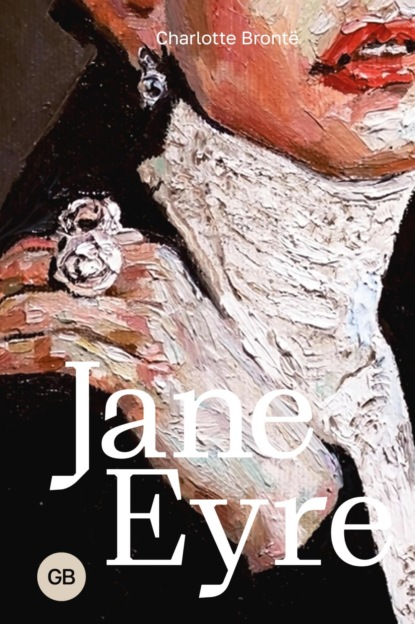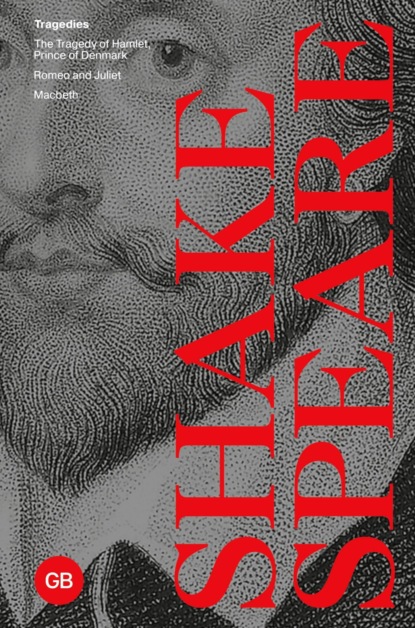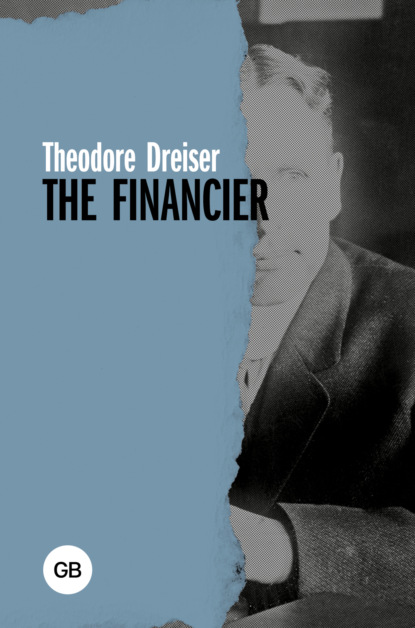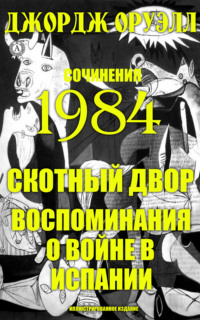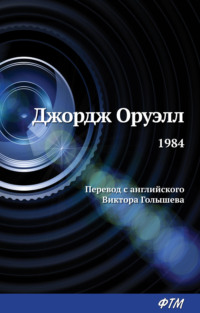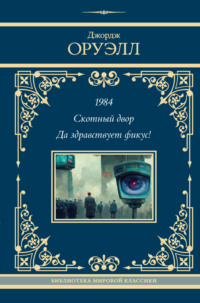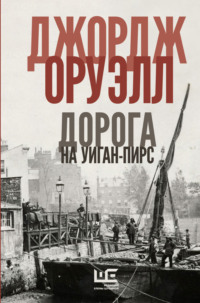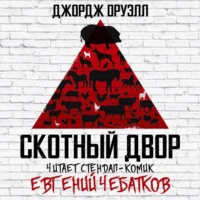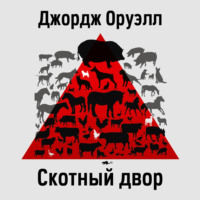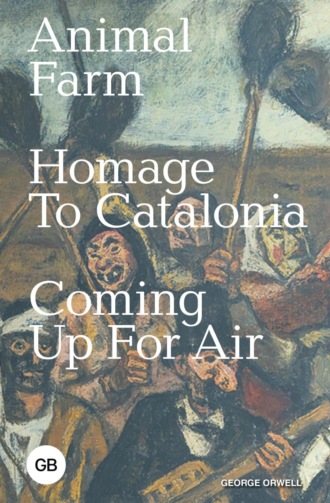
Полная версия
Animal Farm. Homage to Catalonia. Coming Up for Air / Скотный двор. Памяти Каталонии. Глотнуть воздуха

Джордж Оруэлл
Animal Farm. Homage to Catalonia. Coming Up for Air / Скотный двор. Памяти Каталонии. Глотнуть воздуха
© ООО «Издательство АСТ», 2023
Homage to Catalonia
Chapter One
IN the Lenin Barracks in Barcelona, the day before I joined the militia, I saw an Italian militiaman standing in front of the officers’ table.
He was a tough-looking youth of twenty-five or six, with reddish-yellow hair and powerful shoulders. His peaked leather cap was pulled fiercely over one eye. He was standing in profile to me, his chin on his breast, gazing with a puzzled frown at a map which one of the officers had open on the table. Something in his face deeply moved me. It was the face of a man who would commit murder and throw away his life for a friend-the kind efface you would expect in an Anarchist, though as likely as not he was a Communist. There were both candour and ferocity in it; also the pathetic reverence that illiterate people have for their supposed superiors. Obviously he could not make head or tail of the map; obviously he regarded map-reading as a stupendous intellectual feat. I hardly know why, but I have seldom seen anyone-any man, I mean-to whom I have taken such an immediate liking. While they were talking round the table some remark brought it out that I was a foreigner. The Italian raised his head and said quickly:
‘Italiano?’
I answered in my bad Spanish: ‘No, Ingles. Y tu?’
‘Italiano.’
As we went out he stepped across the room and gripped my hand very hard. Queer, the affection you can feel for a stranger! It was as though his spirit and mine had momentarily succeeded in bridging the gulf of language and tradition and meeting in utter intimacy. I hoped he liked me as well as I liked him. But I also knew that to retain my first impression of him I must not see him again; and needless to say I never did see him again. One was always making contacts of that kind in Spain.
I mention this Italian militiaman because he has stuck vividly in my memory. With his shabby uniform and fierce pathetic face he typifies for me the special atmosphere of that time. He is bound up with all my memories of that period of the war-the red flags in Barcelona, the gaunt trains full of shabby soldiers creeping to the front, the grey war-stricken towns farther up the line, the muddy, ice-cold trenches in the mountains.
This was in late December 1936, less than seven months ago as I write, and yet it is a period that has already receded into enormous distance. Later events have obliterated it much more completely than they have obliterated 1935, or 1905, for that matter. I had come to Spain with some notion of writing newspaper articles, but I had joined the militia almost immediately, because at that time and in that atmosphere it seemed the only conceivable thing to do. The Anarchists were still in virtual control of Catalonia and the revolution was still in full swing. To anyone who had been there since the beginning it probably seemed even in December or January that the revolutionary period was ending; but when one came straight from England the aspect of Barcelona was something startling and overwhelming. It was the first time that I had ever been in a town where the working class was in the saddle. Practically every building of any size had been seized by the workers and was draped with red flags or with the red and black flag of the Anarchists; every wall was scrawled with the hammer and sickle and with the initials of the revolutionary parties; almost every church had been gutted and its images burnt. Churches here and there were being systematically demolished by gangs of workmen. Every shop and cafe had an inscription saying that it had been collectivized; even the bootblacks had been collectivized and their boxes painted red and black. Waiters and shop-walkers looked you in the face and treated you as an equal. Servile and even ceremonial forms of speech had temporarily disappeared. Nobody said ‘Senior’ or ‘Don’ or even ‘Usted’; everyone called everyone else ‘Comrade’ and ‘Thou’, and said ‘Salud!’ instead of ‘Buenos dias’. Tipping was forbidden by law; almost my first experience was receiving a lecture from a hotel manager for trying to tip a lift-boy. There were no private motor-cars, they had all been commandeered, and all the trams and taxis and much of the other transport were painted red and black. The revolutionary posters were everywhere, flaming from the walls in clean reds and blues that made the few remaining advertisements look like daubs of mud. Down the Ramblas, the wide central artery of the town where crowds of people streamed constantly to and fro, the loudspeakers were bellowing revolutionary songs all day and far into the night. And it was the aspect of the crowds that was the queerest thing of all. In outward appearance it was a town in which the wealthy classes had practically ceased to exist. Except for a small number of women and foreigners there were no ‘well-dressed’ people at all. Practically everyone wore rough working-class clothes, or blue overalls, or some variant of the militia uniform. All this was queer and moving. There was much in it that I did not understand, in some ways I did not even like it, but I recognized it immediately as a state of affairs worth fighting for. Also I believed that things were as they appeared, that this was really a workers’ State and that the entire bourgeoisie had either fled, been killed, or voluntarily come over to the workers’ side; I did not realize that great numbers of well-to-do bourgeois were simply lying low and disguising themselves as proletarians for the time being.
Together with all this there was something of the evil atmosphere of war. The town had a gaunt untidy look, roads and buildings were in poor repair, the streets at night were dimly lit for fear of air-raids, the shops were mostly shabby and half-empty. Meat was scarce and milk practically unobtainable, there was a shortage of coal, sugar, and petrol, and a really serious shortage of bread. Even at this period the bread-queues were often hundreds of yards long. Yet so far as one could judge the people were contented and hopeful. There was no unemployment, and the price of living was still extremely low; you saw very few conspicuously destitute people, and no beggars except the gipsies. Above all, there was a belief in the revolution and the future, a feeling of having suddenly emerged into an era of equality and freedom. Human beings were trying to behave as human beings and not as cogs in the capitalist machine. In the barbers’ shops were Anarchist notices (the barbers were mostly Anarchists) solemnly explaining that barbers were no longer slaves. In the streets were coloured posters appealing to prostitutes to stop being prostitutes. To anyone from the hard-boiled, sneering civilization of the English-speaking races there was something rather pathetic in the literalness with which these idealistic Spaniards took the hackneyed phrases of revolution. At that time revolutionary ballads of the naivest kind, all about proletarian brotherhood and the wickedness of Mussolini, were being sold on the streets for a few centimes each. I have often seen an illiterate militiaman buy one of these ballads, laboriously spell out the words, and then, when he had got the hang of it, begin singing it to an appropriate tune.
All this time I was at the Lenin Barracks, ostensibly in training for the front. When I joined the militia I had been told that I should be sent to the front the next day, but in fact I had to wait while a fresh centuria was got ready. The workers’ militias, hurriedly raised by the trade unions at the beginning of the war, had not yet been organized on an ordinary army basis. The units of command were the ‘section’, of about thirty men, the centuria, of about a hundred men, and the ‘column’, which in practice meant any large number of men. The Lenin Barracks was a block of splendid stone buildings with a riding-school and enormous cobbled courtyards; it had been a cavalry barracks and had been captured during the July fighting. My centuria slept in one of the stables, under the stone mangers where the names of the cavalry chargers were still inscribed. All the horses had been seized and sent to the front, but the whole place still smelt of horse-piss and rotten oats. I was at the barracks about a week. Chiefly I remember the horsy smells, the quavering bugle-calls (all our buglers were amateurs-I first learned the Spanish bugle-calls by listening to them outside the Fascist lines), the tramp-tramp of hobnailed boots in the barrack yard, the long morning parades in the wintry sunshine, the wild games of football, fifty a side, in the gravelled riding-school. There were perhaps a thousand men at the barracks, and a score or so of women, apart from the militiamen’s wives who did the cooking. There were still women serving in the militias, though not very many. In the early battles they had fought side by side with the men as a matter of course. It is a thing that seems natural in time of revolution. Ideas were changing already, however. The militiamen had to be kept out of the riding-school while the women were drilling there because they laughed at the women and put them off. A few months earlier no one would have seen anything comic in a woman handling a gun.
The whole barracks was in the state of filth and chaos to which the militia reduced every building they occupied and which seems to be one of the by-products of revolution. In every comer you came upon piles of smashed furniture, broken saddles, brass cavalry-helmets, empty sabre-scabbards, and decaying food. There was frightful wastage of food, especially bread. From my barrack-room alone a basketful of bread was thrown away at every meal-a disgraceful thing when the civilian population was short of it. We ate at long trestle-tables out of permanently greasy tin pannikins, and drank out of a dreadful thing called a porron. A porron is a sort of glass bottle with a pointed spout from which a thin jet of wine spurts out whenever you tip it up; you can thus drink from a distance, without touching it with your lips, and it can be passed from hand to hand. I went on strike and demanded a drinking-cup as soon as I saw a porron in use. To my eye the things were altogether too like bed-bottles, especially when they were filled with white wine.
By degrees they were issuing the recruits with uniforms, and because this was Spain everything was issued piecemeal, so that it was never quite certain who had received what, and various of the things we most needed, such as belts and cartridge-boxes, were not issued till the last moment, when the train was actually waiting to take us to the front. I have spoken of the militia ‘uniform’, which probably gives a wrong impression. It was not exactly a uniform. Perhaps a ‘multiform’ would be the proper name for it. Everyone’s clothes followed the same general plan, but they were never quite the same in any two cases. Practically everyone in the army wore corduroy knee-breeches, but there the uniformity ended. Some wore puttees, others corduroy gaiters, others leather leggings or high boots. Everyone wore a zipper jacket, but some of the jackets were of leather, others of wool and of every conceivable colour. The kinds of cap were about as numerous as their wearers. It was usual to adorn the front of your cap with a party badge, and in addition nearly every man. wore a red or red and black handkerchief round his throat. A militia column at that time was an extraordinary-looking rabble. But the clothes had to be issued as this or that factory rushed them out, and they were not bad clothes considering the circumstances. The shirts and socks were wretched cotton things, however, quite useless against cold. I hate to think of what the militiamen must have gone through in the earlier months before anything was organized. I remember coming upon a newspaper of only about two months earlier in which one of the P.O.U.M. leaders, after a visit to the front, said that he would try to see to it that ‘every militiaman had a blanket’. A phrase to make you shudder if you have ever slept in a trench.
On my second day at the barracks there began what was comically called ‘instruction’. At the beginning there were frightful scenes of chaos. The recruits were mostly boys of sixteen or seventeen from the back streets of Barcelona, full of revolutionary ardour but completely ignorant of the meaning of war. It was impossible even to get them to stand in line. Discipline did not exist; if a man disliked an order he would step out of the ranks and argue fiercely with the officer. The lieutenant who instructed us was a stout, fresh-faced, pleasant young man who had previously been a Regular Army officer, and still looked like one, with his smart carriage and spick-and-span uniform. Curiously enough he was a sincere and ardent Socialist. Even more than the men themselves he insisted upon complete social equality between all ranks. I remember his pained surprise when an ignorant recruit addressed him as ‘Senor’. ‘What! Senor? Who is that calling me Senor? Are we not all comrades?’ I doubt whether it made his job any easier. Meanwhile the raw recruits were getting no military training that could be of the slightest use to them. I had been told that foreigners were not obliged to attend ‘instruction’ (the Spaniards, I noticed, had a pathetic belief that all foreigners knew more of military matters than themselves), but naturally I turned out with the others. I was very anxious to learn how to use a machine-gun; it was a weapon I had never had a chance to handle. To my dismay I found that we were taught nothing about the use of weapons. The so-called instruction was simply parade-ground drill of the most antiquated, stupid kind; right turn, left turn, about turn, marching at attention in column of threes and all the rest of that useless nonsense which I had learned when I was fifteen years old. It was an extraordinary form for the training of a guerilla army to take. Obviously if you have only a few days in which to train a soldier, you must teach him the things he will most need; how to take cover, how to advance across open ground, how to mount guards and build a parapet-above all, how to use his weapons. Yet this mob of eager children, who were going to be thrown into the front line in a few days’ time, were not even taught how to fire a rifle or pull the pin out of a bomb. At the time I did not grasp that this was because there were no weapons to be had. In the P.O.U.M. militia the shortage of rifles was so desperate that fresh troops reaching the front always had to take their rifles from the troops they relieved in the line. In the whole of the Lenin Barracks there were, I believe, no rifles except those used by the sentries.
After a few days, though still a complete rabble by any ordinary standard, we were considered fit to be seen in public, and in the mornings we were marched out to the public gardens on the hill beyond the Plaza de Espana. This was the common drill-ground of all the party militias, besides the Carabineros and the first contingents of the newly formed Popular Army. Up in the public gardens it was a strange and heartening sight. Down every path and alley-way, amid the formal flower-beds, squads and companies of men marched stiffly to and fro, throwing out their chests and trying desperately to look like soldiers. All of them were unarmed and none completely in uniform, though on most of them the militia uniform was breaking out in patches here and there. The procedure was always very much the same. For three hours we strutted to and fro (the Spanish marching step is very short and rapid), then we halted, broke the ranks, and flocked thirstily to a little grocer’s shop which was half-way down the hill and was doing a roaring trade in cheap wine. Everyone was very friendly to me. As an Englishman I was something of a curiosity, and the Carabinero officers made much of me and stood me drinks. Meanwhile, whenever I could get our lieutenant into a corner, I was clamouring to be instructed in the use of a machine-gun. I used to drag my Hugo’s dictionary out of my pocket and start on him in my villainous Spanish:
‘To se manejar fusil. Mo se manejar ametralladora. Quiero apprender ametralladora. Quando vamos apprender ametralladora?’
The answer was always a harassed smile and a promise that there should be machine-gun instruction manana. Needless to say manana never came. Several days passed and the recruits learned to march in step and spring to attention almost smartly, but if they knew which end of a rifle the bullet came out of, that was all they knew. One day an armed Carabinero strolled up to us when we were halting and allowed us to examine his rifle. It turned out that in the whole of my section no one except myself even knew how to load the rifle, much less how to take aim.
All this time I was having the usual struggles with the Spanish language. Apart from myself there was only one Englishman at the barracks, and nobody even among the officers spoke a word of French. Things were not made easier for me by the fact that when my companions spoke to one another they generally spoke in Catalan. The only way I could get along was to carry everywhere a small dictionary which I whipped out of my pocket in moments of crisis. But I would sooner be a foreigner in Spain than in most countries. How easy it is to make friends in Spain I Within a day or two there was a score of militiamen who called me by my Christian name, showed me the ropes, and overwhelmed me with hospitality. I am not writing a book of propaganda and I do not want to idealize the P.O.U.M. militia. The whole militia-system had serious faults, and the men themselves were a mixed lot, for by this time voluntary recruitment was falling off and many of the best men were already at the front or dead. There was always among us a certain percentage who were completely useless. Boys of fifteen were being brought up for enlistment by their parents, quite openly for the sake of the ten pesetas a day which was the militiaman’s wage; also for the sake of the bread which the militia received in plenty and could smuggle home to their parents. But I defy anyone to be thrown as I was among the Spanish working class-I ought perhaps to say the Catalan working class, for apart from a few Aragonese and Andalusians I mixed only with Catalans-and not be struck by their essential decency; above all, their straightforwardness and generosity. A Spaniard’s generosity, in the ordinary sense of the word, is at times almost embarrassing. If you ask him for a cigarette he will force the whole packet upon you. And beyond this there is generosity in a deeper sense, a real largeness of spirit, which I have met with again and again in the most unpromising circumstances. Some of the journalists and other foreigners who travelled in Spain during the war have declared that in secret the Spaniards were bitterly jealous of foreign aid. All I can say is that I never observed anything of the kind. I remember that a few days before I left the barracks a group of men returned on leave from the front. They were talking excitedly about their experiences and were full of enthusiasm for some French troops who had been next to them at Huesca. The French were very brave, they said; adding enthusiastically: ‘Mas valientes que nosotros’-‘Braver than we are!’ Of course I demurred, whereupon they explained that the French knew more of the art of war-were more expert with bombs, machine-guns, and so forth. Yet the remark was significant. An Englishman would cut his hand off sooner than say a thing like that.
Every foreigner who served in the militia spent his first few weeks in learning to love the Spaniards and in being exasperated by certain of their characteristics. In the front line my own exasperation sometimes reached the pitch of fury. The Spaniards are good at many things, but not at making war. All foreigners alike are appalled by their inefficiency, above all their maddening unpunctuality. The one Spanish word that no foreigner can avoid learning is manana-‘tomorrow’ (literally, ‘the morning’). Whenever it is conceivably possible, the business of today is put off until manana. This is so notorious that even the Spaniards themselves make jokes about it. In Spain nothing, from a meal to a battle, ever happens at the appointed time. As a general rule things happen too late, but just occasionally-just so that you shan’t even be able to depend on their happening late-they happen too early. A train which is due to leave at eight will normally leave at any time between nine and ten, but perhaps once a week, thanks to some private whim of the engine-driver, it leaves at half past seven. Such things can be a little trying. In theory I rather admire the Spaniards for not sharing our Northern time-neurosis; but unfortunately I share it myself.
After endless rumours, mananas, and delays we were suddenly ordered to the front at two hours’ notice, when much of our equipment was still unissued. There were terrible tumults in the quartermaster’s store; in the end numbers of men had to leave without their full equipment. The barracks had promptly filled with women who seemed to have sprung up from the ground and were helping their men-folk to roll their blankets and pack their kit-bags. It was rather humiliating that I had to be shown how to put on my new leather cartridge-boxes by a Spanish girl, the wife of Williams, the other English militiaman. She was a gentle, dark-eyed, intensely feminine creature who looked as though her life-work was to rock a cradle, but who as a matter of fact had fought bravely in the street-battles of July. At this time she was carrying a baby which was born just ten months after the outbreak of war and had perhaps been begotten behind a barricade.
The train was due to leave at eight, and it was about ten past eight when the harassed, sweating officers managed to marshal us in the barrack square. I remember very vividly the torchlit scene-the uproar and excitement, the red flags flapping in the torchlight, the massed ranks of militiamen with their knapsacks on their backs and their rolled blankets worn bandolier-wise across the shoulder; and the shouting and the clatter of boots and tin pannikins, and then a tremendous and finally successful hissing for silence; and then some political commissar standing beneath a huge rolling red banner and making us a speech in Catalan. Finally they marched us to the station, taking the longest route, three or four miles, so as to show us to the whole town. In the Ramblas they halted us while a borrowed band played some revolutionary tune or other. Once again the conquering-hero stuff-shouting and enthusiasm, red flags and red and black flags everywhere, friendly crowds thronging the pavement to have a look at us, women waving from the windows. How natural it all seemed then; how remote and improbable now! The train was packed so tight with men that there was barely room even on the floor, let alone on the seats. At the last moment Williams’s wife came rushing down the platform and gave us a bottle of wine and a foot of that bright red sausage which tastes of soap and gives you diarrhoea. The train crawled out of Catalonia and on to the plateau of Aragon at the normal wartime speed of something under twenty kilometres an hour.
Chapter Two
BARBASTRO, though a long way from the front line, looked bleak and chipped. Swarms of militiamen in shabby uniforms wandered up and down the streets, trying to keep warm. On a ruinous wall I came upon a poster dating from the previous year and announcing that ‘six handsome bulls’ would be killed in the arena on such and such a date. How forlorn its faded colours looked! Where were the handsome bulls and the handsome bull-fighters now? It appeared that even in Barcelona there were hardly any bullfights nowadays; for some reason all the best matadors were Fascists.
They sent my company by lorry to Sietamo, then westward to Alcubierre, which was just behind the line fronting Zaragoza. Sietamo had been fought over three times before the Anarchists finally took it in October, and parts of it were smashed to pieces by shell-fire and most of the houses pockmarked by rifle-bullets. We were 1500 feet above sea-level now. It was beastly cold, with dense mists that came swirling up from nowhere. Between Sietamo and Alcubierre the lorry-driver lost his way (this was one of the regular features of the war) and we were wandering for hours in the mist. It was late at night when we reached Alcubierre. Somebody shepherded us through morasses of mud into a mule-stable where we dug ourselves down into the chaff and promptly fell asleep. Chaff is not bad to sleep in when it is clean, not so good as hay but better than straw. It was only in the morning light that I discovered that the chaff was full of breadcrusts, torn newspapers, bones, dead rats, and jagged milk tins.




